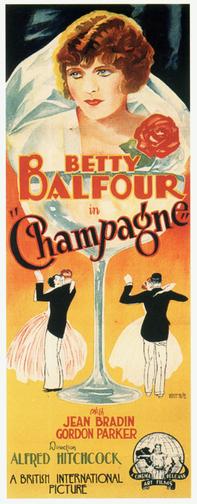Hitchcock revisited the theme of intergenerational strife, centering on the theme of the displaced and ungrateful rich child in Champagne, his eighth silent feature.
| Champagne | |
|---|---|

poster
|
|
The protagonist, Betty (Betty Balfour), is a rich girl embarking on a trip around the world, by plane, ship and foot.
But her millionaire father (Gordon Harker) shows immense dislike for her boyfriend (Jean Bardin).
To teach her a lesson, the father tells Betty that the family had lost its fortune, based on the champagne industry. The father then hires a private detective (Theo van Alten) to protect his daughter
The irony is that in the course of the mildly engaging narrative, in order to make a living, Betty has to sell champagne in a cabaret. In the happy end, Betty proves to be feisty and the father forgives his daughter and even agrees to her marriage.
The beginning and the ending of Champagne is “symmetric,” showing in close-up a glass of champagne. The first person to drink is the private eye-guard.
Moral Education of Women: Recurrent Motif
“Champagne” belongs to a series of films that Hitchcock made about the moral education of young women, also seen in the later and better films, “Notorious,” with Ingrid Bergman, “The Birds,” and “Marnie,” both starring Tippi Hedren.
The process of education (or resocialization) initially involves a downward mobility before there’s way back up. Thus, Betty goes from being a careless, fun-loving flapper to a woman who works as a cabaret girl and actress.
Some humor in interspersed throughout, as in a scene depicting the way a drunk walks aboard a ship, when he is tipsy or sober.
Curio:
In the opening scene, Hitchcock pokes fun at the cultural obsession with the tango dance at the time.
Cast
Betty Balfour – Betty
Jean Bradin – The Boy
Gordon Harker – Mark, Betty’s Father
Ferdinand von Alten – The Man (as Theo von Alten)
Supporting cast, uncredited:
Jack Trevor – The Officer
Claude Hulbert – Club Guest
Marcel Vibert – Maitre d’Hotel
Hannah Jones – Club Servant
Clifford Heatherley – The Manager
Vivian Gibson
Sunday Wilshin
Phyllis Konstam
Alexander D’Arcy
Fanny Wright
Gwen Mannering
Balliol and Merton
Credits:
Directed by Alfred Hitchcock
Screenplay by Hitchcock, Eliot Stannard
Story by Walter C. Mycroft
Produced by John Maxwell
Cinematography Jack E. Cox
Edited by Hitchcock
Production company: British International Pictures
Distributed by Wardour Films (UK)
Release date: August 20, 1928 (UK)
Running time: 90 mins (preserved version); 105 mins (2012 restoration)
Language silent film with English intertitles










